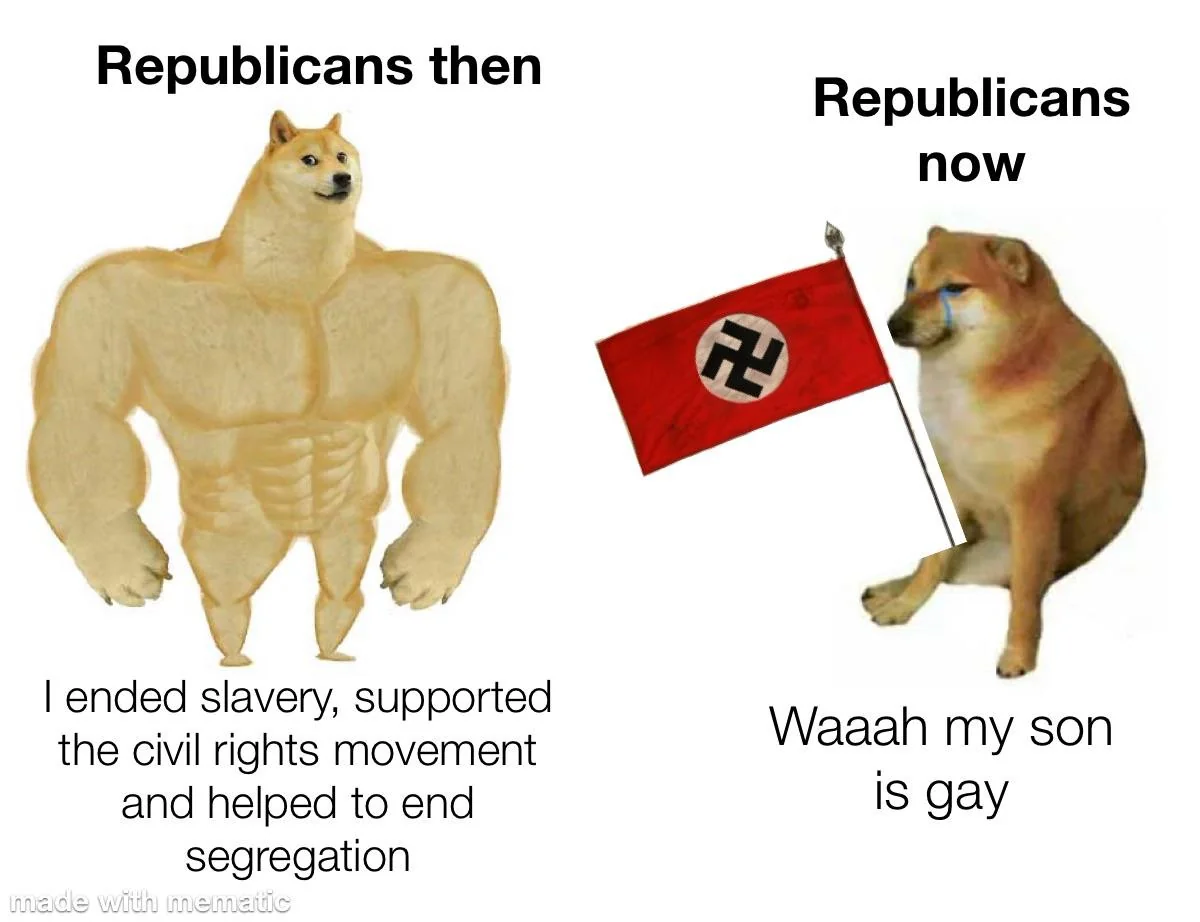this post was submitted on 06 Jul 2024
609 points (96.6% liked)
Political Memes
6038 readers
3466 users here now
Welcome to politcal memes!
These are our rules:
Be civil
Jokes are okay, but don’t intentionally harass or disturb any member of our community. Sexism, racism and bigotry are not allowed. Good faith argumentation only. No posts discouraging people to vote or shaming people for voting.
No misinformation
Don’t post any intentional misinformation. When asked by mods, provide sources for any claims you make.
Posts should be memes
Random pictures do not qualify as memes. Relevance to politics is required.
No bots, spam or self-promotion
Follow instance rules, ask for your bot to be allowed on this community.
founded 2 years ago
MODERATORS
you are viewing a single comment's thread
view the rest of the comments
view the rest of the comments

If it exists it wasn't ended or abolished. Definitionally. I agree that there were some Republicans that felt that way. Not enough and not all. The fact that they held on to it for punitive reasons only proves my point.
I would argue that forced labor without profit motive or ownership of a person is so far removed from slavery as to not warrant the term. Community service is slavery under that definition (and, in fact, challenges on the basis of the 13th have been [unsuccessfully] leveled against community service), yet I think few of us would view some rich twat getting a hundred hours of community service for a DUI to be slavery in any form, even on a purely technical level.
Labor as punishment is not effective or worth keeping as a tool for ensuring the compliance of a free citizenry by its government, but I also don't think that it is inherently slavery. My point thus is that the 13th Amendment was not meant simply as a punishment, but as a genuine attempt (emphasis on 'attempt') to end slavery as an institution.
Many of our prisons are privately owned. A profit motive is securely attached at this point at least. And I would argue it has been for a long time.
I 100% agree with you that it isn't effective. I just don't partake in the semantics on it. It is slavery. It's called slavery in the amendment. That means it's slavery. Just of a different kind.
Just FYI, a very small percentage of our prisons are privately owned. Something like 20%. However, the percentage of jails that are privately owned is more like 80%
My point is not to defend modern prison labor, which is pretty indefensible, my point is that the exception carved out for punishment was not meant as slavery-by-other-means, even if that's what it turned into. See: 'grinding the wind' in contemporary prisons of the time.
It's dumb and pointless, but was not meant to have a profit motive. It was meant as punishment, in the delusion that work was 'reformative'.
And considering that legislators are often involved with the legal profession, the wording is carefully chosen - legal challenges to 'involuntary servitude' have been issued on everything from community service to military contracts. Slavery, as we would recognize it, was intended to be exterminated by the 13th. What kind of evidence would you accept for the intention of the drafters of the 13th to eradicate slavery?
Chain gangs were an innovation that primarily came about after the Civil War and the abolition of slavery, and championed by local elites in the South - I don't find it a particularly compelling idea that the Radical Republicans in the Federal government were considering that before chain gangs became widespread. Furthermore, extensive civil rights actions were passed in the Reconstruction era when the Radical Republicans still dominated the government, including anti-segregation legislation and the election of the first African-American Congressmen. It was only once the time of the Radicals had passed and Reconstruction had been ended that Jim Crow laws as we would recognize it took hold.